SEO
5 Key Enterprise SEO Trends For 2024

SEO has undergone many transitions and disruptions in a short time.
Enterprise SEO has been at the center of some fundamental transformations over the past year.
Adapting to the ever-changing needs and demands of consumers, integrating AI into search engines, and the influx of new generative AI SEO and content tools have forced organizations to adapt and evolve their marketing strategies.
In this article, I will delve deeper into five key enterprise SEO trends for 2024 with tips to help you keep pace with change and prepare for future success accordingly.
What Is Enterprise SEO?
Enterprise SEO is typically associated with implementing SEO strategies within large-scale organizations.
It predominantly applies to sizable brands with multiple departments and complex infrastructures. This can include large – and multiple – websites that offer a diverse array of products and services.
One of the key differences between standard SEO and enterprise SEO is the need for the workflow management of stakeholders, strategic planning, and ensuring strategies align with an organization’s broader – and, in many cases, multiple – objectives.
How Enterprise SEO Has Changed
In 2024, enterprise SEO trends will be shaped by technological advancements, changing user behaviors, and the evolving search landscape.
It’s no secret that the way search engines utilize generative AI to create new user experiences is changing how enterprises look at, and understand, what is happening in the search engine results pages (SERPs).
This includes shifting from pure keyword research leveraging data-led insights to understanding conversational intent that triggers search results.
Whether you are searching via traditional results or in Google SGE labs, results now contain more sources and multiple content formats. As a result, enterprises must become more innovative and proactive in their SEO and content marketing approaches.
The great thing to see is that the role of SEO is growing and expanding in this new AI era.
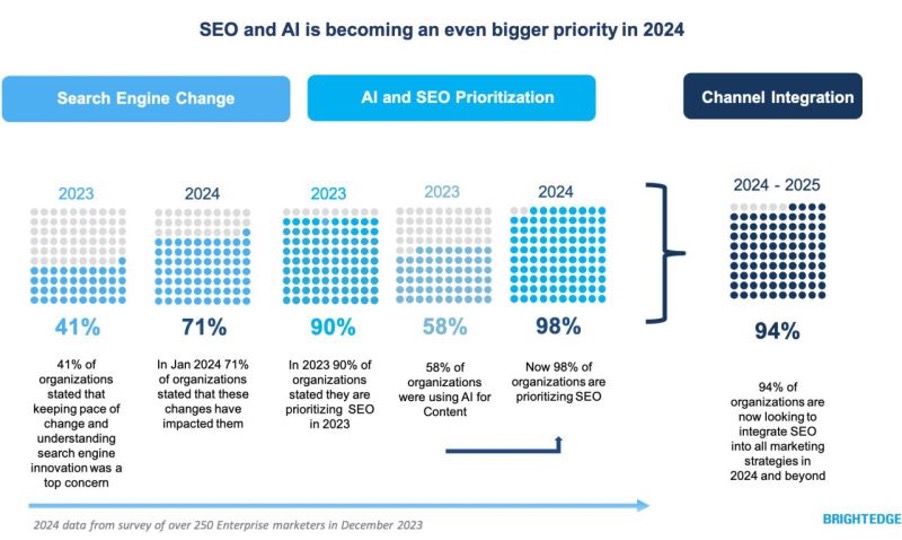
5 Essential Enterprise SEO Trends To Watch In 2024
1. Understanding Market Shift And Ever-Evolving Consumer Preferences
SEO is such a dynamic and intense discipline that, for the majority, it can be a ‘heads down,’ laser-focused, task-by-task approach.
However, especially when we look at enterprise SEO and large-scale projects, it is essential to take a step back and ensure you have a pulse on what is happening at a macro level.
For enterprise SEO experts, it is crucial to stay on top of the latest trends and developments in consumer behavior, especially during economic shifts. These shifts can significantly impact how businesses align their more extensive SEO and content strategies to match business objectives.
For example, the pandemic saw rapid shifts in shopping preferences for products related to staying at home.
In any era-changing economic conditions, the importance of SEO reaches an all-time high due to its cost efficiencies and compounding returns, such as branding and data-driven insights into products and all major digital strategies such as paid search, email, and social.
- Market conditions can force organizations to prioritize specific competitor strategies.
- Search algorithm updates may prioritize credibility and authoritative sources, which means content should be optimized accordingly. I will share more on this later in this article.
- Economic changes can also accelerate the use of new technologies, requiring businesses to be flexible and adaptable, and exercise caution in adoption.
Enterprise SEO pros must liaise with key management stakeholders monthly to ensure their strategies align with key business priorities to avoid going down unproductive pathways.
You must use data analytics effectively to understand target audiences and what is changing.
As enterprise SEO is a multi-stakeholder discipline, insights must be fed into organizational strategies to create more holistic, not just channel-agnostic, individualized experiences.
These can range from lead magnets that take the form of tailored marketing communications to customized product content and campaigns.
2. Using Generative AI For SEO And Content: Managing Risk Vs. Reward
According to Bloomberg Intelligence, by 2032, generative AI will be worth $1.3 trillion. Additionally, Gartner research shows that SEO and content marketing are two of the highest areas of increased investment.
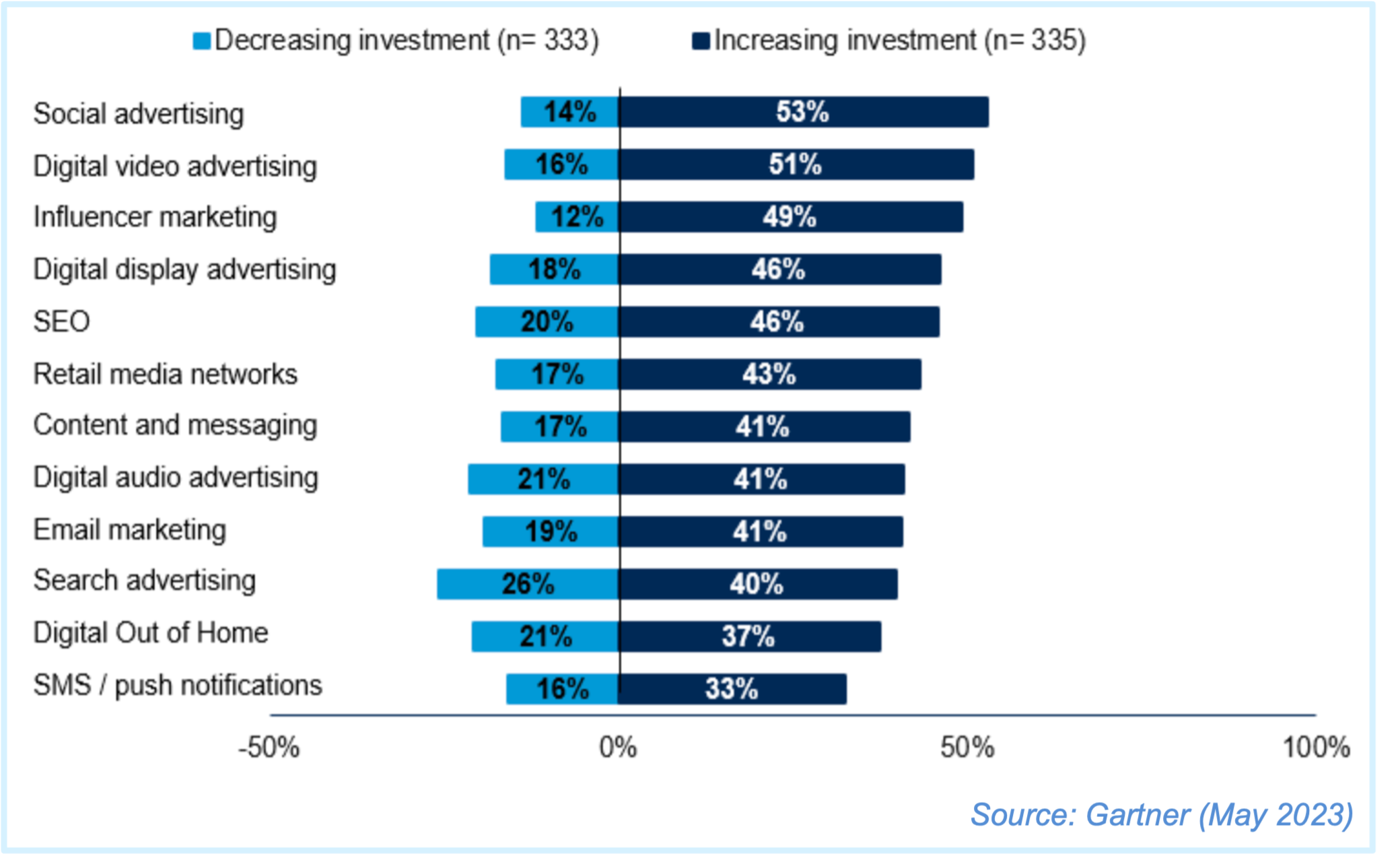

Numbers vary depending on the source, but if you drill down, well over 2,000 generative content AI tools are flooding the market. No doubt you hear about a new one in the news every week!
The challenge for enterprise SEO pros who want to boost content productivity and performance lies in balancing the risk versus reward of using these tools.
Risk: Some of the content generative tools focus on velocity over quality. This is challenging for the consumer and search engines and limits the chance of your brand being discovered in a sea of nonsense.
This is because they are based on single-source, low-quality data sources that are not trained to understand your audience’s needs and wants. They have no understanding of what works in content & SEO.
For brands, this means the content can get buried below irrelevant, low-quality spam-like articles. Over time, I expect Google to solve this.
In addition, as a result, we are seeing more and more government and organization institutions building ethical AI and content creation guidelines and standards related to data use, regulation, and governance.
Always remember the risks.
- Generative AI has severe limitations and liabilities, including the tendency to “hallucinate” by fabricating information when it doesn’t have an answer.
- It can state misinformation so convincingly a reader new to the topic may believe it to be fact.
- It lacks creativity and produces output that tends to be generic and formulaic.
- The content produced is only as good as the input (prompts) and oversight (editorial process) –garbage in, garbage out.
Reward: On the flip side, if correctly used, generative AI tools can help improve content productivity and scale content for SEO campaigns.
- Help give valuable insights and inspiration: The cornerstone of successful campaign development is the strategic generation of ideas. Marketers can create compelling content by using generative AI to uncover popular search terms, monitor social media trends, and discover unique angles and ideas.
- Accelerate content production creation efficiency: Generative AI can also help segment audiences based on demographics, preferences, and behaviors, enabling you to tailor personalization strategies and unique experiences. It can also assist in timely (short-from) email marketing and crafting specific messages for each key target audience.
- Scale productivity and performance: For enterprise SEO pros who use platforms rather than multiple tools with disparate data sources, AI-generated content can be created in one platform that also helps you streamline workflows. Due to built-in privacy considerations and guardrails, platform-specific generative AI tools are likely safer to use. They can create content based on your existing assets and utilize high-fidelity and secure data based on search and content patterns. These are helpful for efficient content discovery and distribution, allowing you to focus on strategy and creation.
Recommendations from all-in-one platforms also act as a content and SEO best practice assistant.
3. Preparing For Search Generative Experiences: Your Content And Your Brand
The transition to Search Generative Experiences (SGE) marks the most substantial transformation in the history of search engines – and a seismic shift that will impact all industries, affecting every company and marketer globally.
SGE represents a paradigm shift in SEO, moving beyond traditional keyword-based tactics to embrace the power of generative AI.
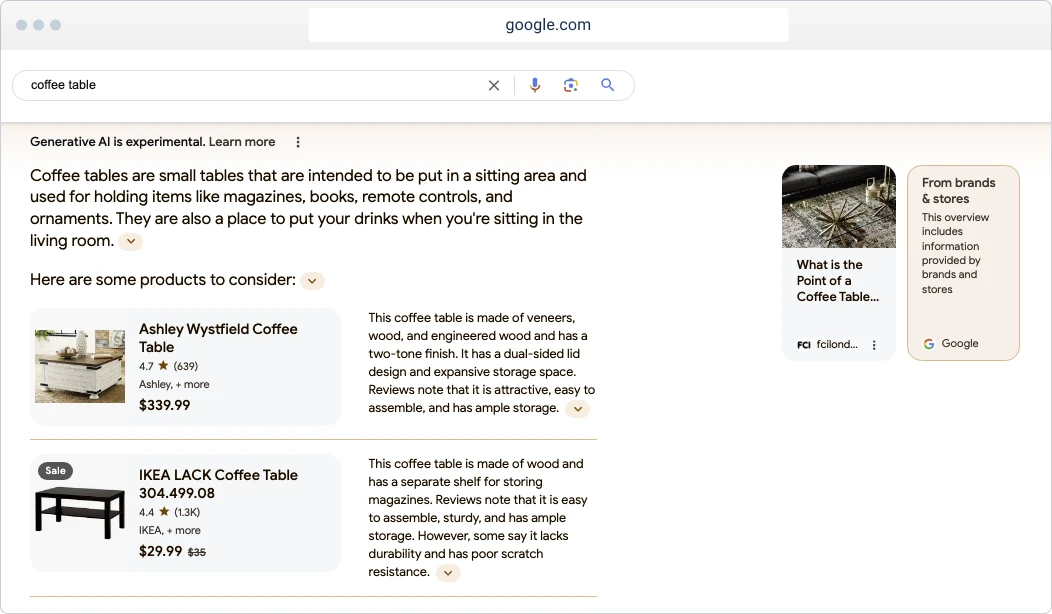

As AI emerges and becomes almost a “mediator” between a company’s content and its users, one search can produce results that would have previously taken five separate searches.
Take retail shopping as an instance: AI will start to recommend a complete shopping experience that gives consumers an experience that contains many channels and sources and multiple forms of media.
For consumers, this promises deeper and more interactive experiences, leading to increased engagement and time spent on Google.
For brands, it means higher value clicks once a consumer is ready to visit your website.
I have been monitoring this (at BrightEdge) for a long time. I see experiments in critical areas that you should keep an eye on! For example:
- Testing of over 22 new content formats in SGE results.
- There are many warnings in the healthcare and YMVL industries, as Google is exercising caution.
- New visual content formats are used in industries such as e-commerce.
- More reviews are being added to results in areas like entertainment.
- There is a big focus on places (local) being integrated into results.
To help SEJ readers and the whole community, you can view for free (ungated) the data behind all these findings and a step-by-step guide to understanding this Ultimate Guide to SGE.
Note: This is still in Google Labs and has not been rolled yet. However, from the above, I firmly predict this is a matter of when, where, and how it will proceed.
4. Understanding And Adapting To New Search Behaviours: Data And Conversational Intent
Utilizing data to grasp user behavior and the underlying intent in conversations will be crucial for SEO success in both traditional and AI-driven search results.
Search is becoming conversational, and marketers must focus on user intent, advancing their understanding of their audience from simple keyword optimization to grasping conversational intent and extended phrases.
For users, this translates into more captivating and immersive experiences, leading to increased time spent on Google. This optimizes their search, guiding them swiftly to the most pertinent websites that cater to their unique needs.
For marketers, navigating your search presence becomes more intricate yet more fruitful. Anticipate reduced but higher-quality web traffic. Identifying key searches that activate various types of results is essential.
Clicks will carry greater monetary value due to enhanced conversion rates. This is because consumers are more ready to act after being informed and influenced by prior interactions and data from Google.
Marketers need to guarantee that their content strategy not only answers the specific query but also considers the broader context in which the query is made. This will help ensure targeted and effective engagement with users.
However, the core fundamentals of technical and website SEO remain the same. They will become more critical as marketers shift to optimizing their sites for higher-value traffic and clicks.
- Ensure your site is fast and responsive, it is structured, and the content is optimized for human readers. It should be structured to answer their questions in the most engaging and user-friendly way.
- Ensure your content assets are primed for conversion with clear CTAs.
Focusing on contextual signals will be vital for content marketers who want to maximize performance.
For example, schema markup, E-E-A-T, and HCU (even though not regarded as ranking factors) are vital, so search engines and users send signals so they can understand the context behind your site and content.
- Leverage data to decode user behavior and the intent behind conversations, using this insight as a catalyst for generative AI outcomes.
- Develop and refine various content types, such as videos and images, to enhance engagement.
- Coordinate marketing efforts across paid media, social platforms, and public relations to create a unified content campaign strategy.
- Concentrate on tracking metrics like traffic and converting high-quality down-funnel traffic as consumers spend more time on Google before making informed decisions and visiting your website.
And, as I know, you are now thinking. Yes, SGE could mean slightly less but more qualified traffic.
5. Managing Omnichannel Marketing: Managing SEO And Multiple Marketing Disinclines
SEO has long shifted from being a siloed channel, but enterprises must make changes now as consumers and search engine demands drive the need for even closer collaboration.
Given that the SERPs and AI-generated SGE results encompass a variety of media types and formats – including social media, reviews, and news sources – content marketers will need to get closer than ever to their SEO, digital branding, design, social media, and PR teams.
![5 Key Enterprise SEO Trends For 2024 Google search for [food delivery near me]](https://articles.entireweb.com/wp-content/uploads/2024/03/1710780962_870_5-Key-Enterprise-SEO-Trends-For-2024.png) Screenshot for search for [food delivery near me], Google, February 2024
Screenshot for search for [food delivery near me], Google, February 2024![5 Key Enterprise SEO Trends For 2024 Google search for [food delivery near me]](https://articles.entireweb.com/wp-content/uploads/2024/03/1710780962_870_5-Key-Enterprise-SEO-Trends-For-2024.png)
Consumers are no longer consuming media in silos, and that means marketers cannot operate SEO and digital marketing in silos. More than managing PPC and SEO campaigns with a bit of social media will be required in 2024.
This is especially true as AI-powered results contain multiple formats and sources. Whether you are a big brand or not, whoever provides the best experience will win in 2024 – so expect some curveballs from your competition.
This means the relationships between people, processes, and technology must change.
Make sure you are aligning your teams and managing workflows across:
- Design – Images and video.
- Branding and PR – Messaging and company reputation.
- Content – From text to design to social.
- SEO – PPC and Website teams.
- Customer Service teams – For reviews.
- Sales teams for advice on down-funnel CTAs on your site.
For enterprise SEO pros, platforms are the only way you can do this.
Key Takeaways For Enterprise SEO Success In 2024
SEO today is going to be different than SEO tomorrow. SEO tomorrow will be different than the search in March.
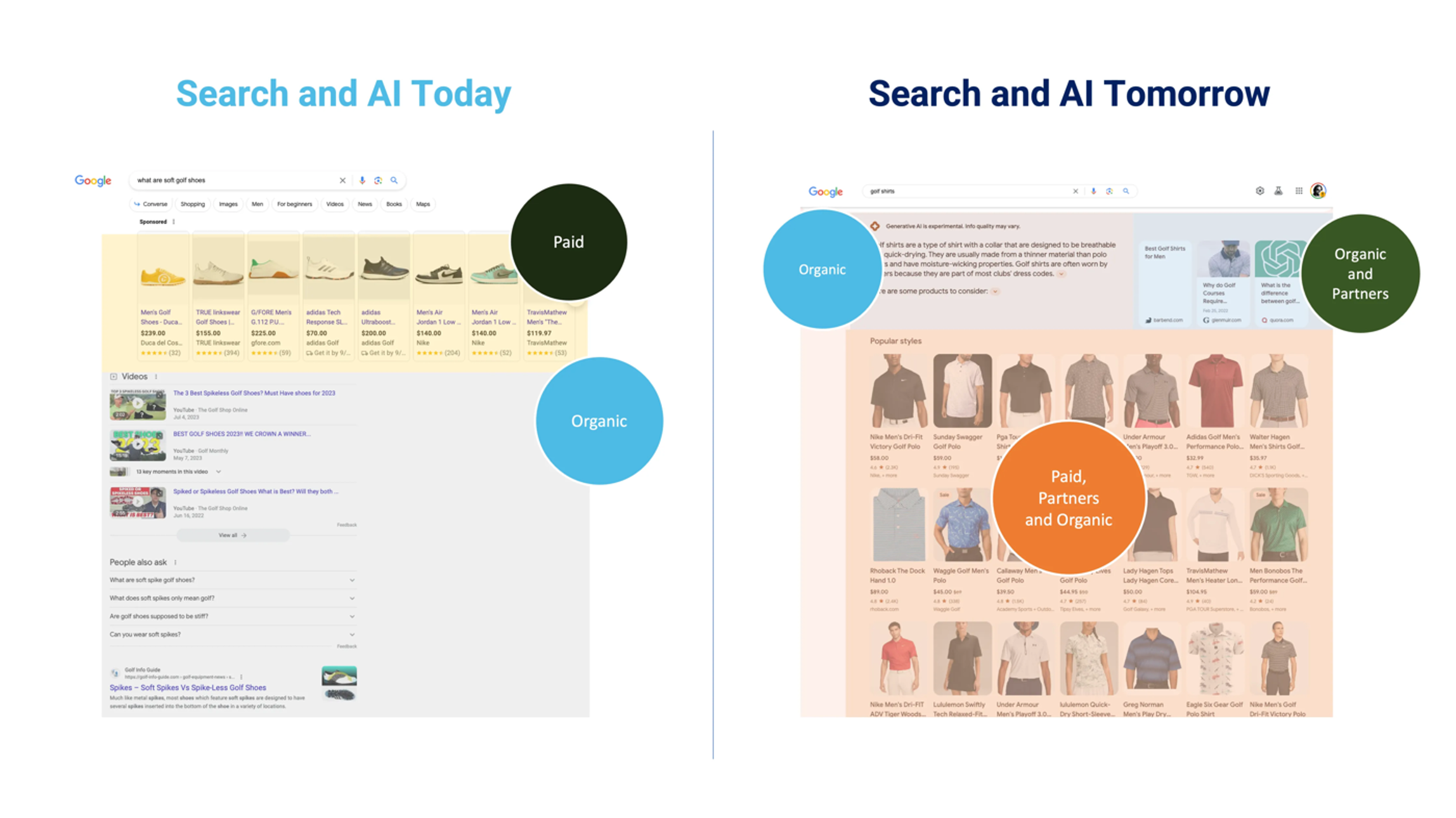 Image from author, February 2024
Image from author, February 2024
Change is the core constant we all share in this industry. Time has shown us that those who keep up with trends and adapt quickly survive and thrive.
As SEO advances alongside AI, keep a core focus on monitoring consumer behavior.
Never forget many of the core principles of SEO still apply, but be ready to help your organization become more agile so your success in enterprise SEO and AI is guaranteed.
In 2024, regardless of the search source, once a consumer clicks, brands that give them the best experience win.
More resources:
Featured Image: Sutthiphong Chandaeng/Shutterstock
SEO
Google March 2024 Core Update Officially Completed A Week Ago
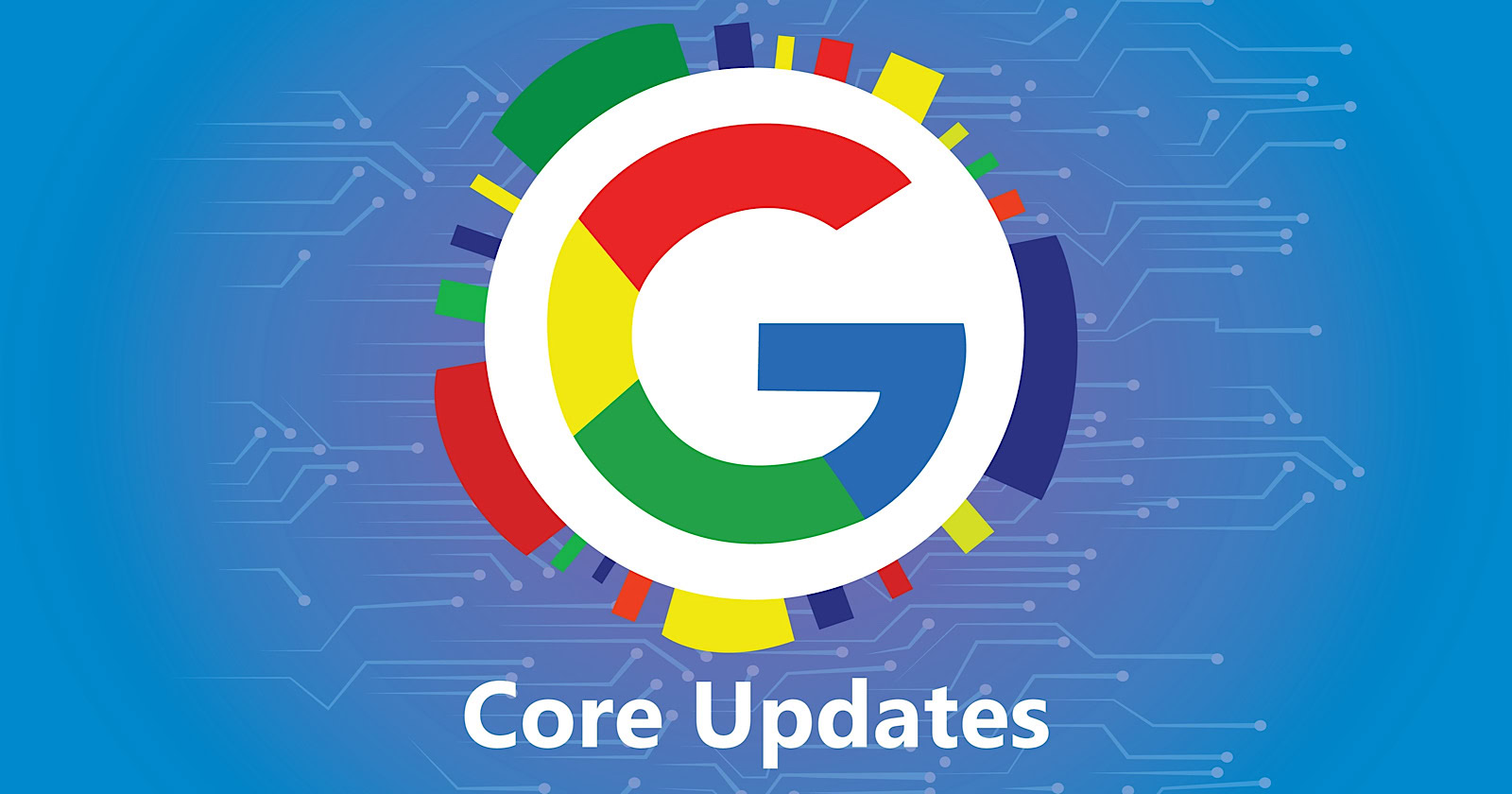
Google has officially completed its March 2024 Core Update, ending over a month of ranking volatility across the web.
However, Google didn’t confirm the rollout’s conclusion on its data anomaly page until April 26—a whole week after the update was completed on April 19.
Many in the SEO community had been speculating for days about whether the turbulent update had wrapped up.
The delayed transparency exemplifies Google’s communication issues with publishers and the need for clarity during core updates
Google March 2024 Core Update Timeline & Status
First announced on March 5, the core algorithm update is complete as of April 19. It took 45 days to complete.
Unlike more routine core refreshes, Google warned this one was more complex.
Google’s documentation reads:
“As this is a complex update, the rollout may take up to a month. It’s likely there will be more fluctuations in rankings than with a regular core update, as different systems get fully updated and reinforce each other.”
The aftershocks were tangible, with some websites reporting losses of over 60% of their organic search traffic, according to data from industry observers.
The ripple effects also led to the deindexing of hundreds of sites that were allegedly violating Google’s guidelines.
Addressing Manipulation Attempts
In its official guidance, Google highlighted the criteria it looks for when targeting link spam and manipulation attempts:
- Creating “low-value content” purely to garner manipulative links and inflate rankings.
- Links intended to boost sites’ rankings artificially, including manipulative outgoing links.
- The “repurposing” of expired domains with radically different content to game search visibility.
The updated guidelines warn:
“Any links that are intended to manipulate rankings in Google Search results may be considered link spam. This includes any behavior that manipulates links to your site or outgoing links from your site.”
John Mueller, a Search Advocate at Google, responded to the turbulence by advising publishers not to make rash changes while the core update was ongoing.
However, he suggested sites could proactively fix issues like unnatural paid links.
“If you have noticed things that are worth improving on your site, I’d go ahead and get things done. The idea is not to make changes just for search engines, right? Your users will be happy if you can make things better even if search engines haven’t updated their view of your site yet.”
Emphasizing Quality Over Links
The core update made notable changes to how Google ranks websites.
Most significantly, Google reduced the importance of links in determining a website’s ranking.
In contrast to the description of links as “an important factor in determining relevancy,” Google’s updated spam policies stripped away the “important” designation, simply calling links “a factor.”
This change aligns with Google’s Gary Illyes’ statements that links aren’t among the top three most influential ranking signals.
Instead, Google is giving more weight to quality, credibility, and substantive content.
Consequently, long-running campaigns favoring low-quality link acquisition and keyword optimizations have been demoted.
With the update complete, SEOs and publishers are left to audit their strategies and websites to ensure alignment with Google’s new perspective on ranking.
Core Update Feedback
Google has opened a ranking feedback form related to this core update.
You can use this form until May 31 to provide feedback to Google’s Search team about any issues noticed after the core update.
While the feedback provided won’t be used to make changes for specific queries or websites, Google says it may help inform general improvements to its search ranking systems for future updates.
Google also updated its help documentation on “Debugging drops in Google Search traffic” to help people understand ranking changes after a core update.
Featured Image: Rohit-Tripathi/Shutterstock
FAQ
After the update, what steps should websites take to align with Google’s new ranking criteria?
After Google’s March 2024 Core Update, websites should:
- Improve the quality, trustworthiness, and depth of their website content.
- Stop heavily focusing on getting as many links as possible and prioritize relevant, high-quality links instead.
- Fix any shady or spam-like SEO tactics on their sites.
- Carefully review their SEO strategies to ensure they follow Google’s new guidelines.
SEO
Google Declares It The “Gemini Era” As Revenue Grows 15%

Alphabet Inc., Google’s parent company, announced its first quarter 2024 financial results today.
While Google reported double-digit growth in key revenue areas, the focus was on its AI developments, dubbed the “Gemini era” by CEO Sundar Pichai.
The Numbers: 15% Revenue Growth, Operating Margins Expand
Alphabet reported Q1 revenues of $80.5 billion, a 15% increase year-over-year, exceeding Wall Street’s projections.
Net income was $23.7 billion, with diluted earnings per share of $1.89. Operating margins expanded to 32%, up from 25% in the prior year.
Ruth Porat, Alphabet’s President and CFO, stated:
“Our strong financial results reflect revenue strength across the company and ongoing efforts to durably reengineer our cost base.”
Google’s core advertising units, such as Search and YouTube, drove growth. Google advertising revenues hit $61.7 billion for the quarter.
The Cloud division also maintained momentum, with revenues of $9.6 billion, up 28% year-over-year.
Pichai highlighted that YouTube and Cloud are expected to exit 2024 at a combined $100 billion annual revenue run rate.
Generative AI Integration in Search
Google experimented with AI-powered features in Search Labs before recently introducing AI overviews into the main search results page.
Regarding the gradual rollout, Pichai states:
“We are being measured in how we do this, focusing on areas where gen AI can improve the Search experience, while also prioritizing traffic to websites and merchants.”
Pichai reports that Google’s generative AI features have answered over a billion queries already:
“We’ve already served billions of queries with our generative AI features. It’s enabling people to access new information, to ask questions in new ways, and to ask more complex questions.”
Google reports increased Search usage and user satisfaction among those interacting with the new AI overview results.
The company also highlighted its “Circle to Search” feature on Android, which allows users to circle objects on their screen or in videos to get instant AI-powered answers via Google Lens.
Reorganizing For The “Gemini Era”
As part of the AI roadmap, Alphabet is consolidating all teams building AI models under the Google DeepMind umbrella.
Pichai revealed that, through hardware and software improvements, the company has reduced machine costs associated with its generative AI search results by 80% over the past year.
He states:
“Our data centers are some of the most high-performing, secure, reliable and efficient in the world. We’ve developed new AI models and algorithms that are more than one hundred times more efficient than they were 18 months ago.
How Will Google Make Money With AI?
Alphabet sees opportunities to monetize AI through its advertising products, Cloud offerings, and subscription services.
Google is integrating Gemini into ad products like Performance Max. The company’s Cloud division is bringing “the best of Google AI” to enterprise customers worldwide.
Google One, the company’s subscription service, surpassed 100 million paid subscribers in Q1 and introduced a new premium plan featuring advanced generative AI capabilities powered by Gemini models.
Future Outlook
Pichai outlined six key advantages positioning Alphabet to lead the “next wave of AI innovation”:
- Research leadership in AI breakthroughs like the multimodal Gemini model
- Robust AI infrastructure and custom TPU chips
- Integrating generative AI into Search to enhance the user experience
- A global product footprint reaching billions
- Streamlined teams and improved execution velocity
- Multiple revenue streams to monetize AI through advertising and cloud
With upcoming events like Google I/O and Google Marketing Live, the company is expected to share further updates on its AI initiatives and product roadmap.
Featured Image: Sergei Elagin/Shutterstock
SEO
brightonSEO Live Blog

Hello everyone. It’s April again, so I’m back in Brighton for another two days of Being the introvert I am, my idea of fun isn’t hanging around our booth all day explaining we’ve run out of t-shirts (seriously, you need to be fast if you want swag!). So I decided to do something useful and live-blog the event instead.
Follow below for talk takeaways and (very) mildly humorous commentary. sun, sea, and SEO!
-
SEARCHENGINES7 days ago
Daily Search Forum Recap: April 19, 2024
-

 WORDPRESS7 days ago
WORDPRESS7 days ago7 Best WooCommerce Points and Rewards Plugins (Free & Paid)
-

 MARKETING7 days ago
MARKETING7 days agoBattling for Attention in the 2024 Election Year Media Frenzy
-

 WORDPRESS6 days ago
WORDPRESS6 days ago13 Best HubSpot Alternatives for 2024 (Free + Paid)
-

 MARKETING6 days ago
MARKETING6 days agoAdvertising in local markets: A playbook for success
-

 SEO7 days ago
SEO7 days agoGoogle Answers Whether Having Two Sites Affects Rankings
-

 SEARCHENGINES6 days ago
SEARCHENGINES6 days agoGoogle Core Update Flux, AdSense Ad Intent, California Link Tax & More
-

 AFFILIATE MARKETING7 days ago
AFFILIATE MARKETING7 days agoGrab Microsoft Project Professional 2021 for $20 During This Flash Sale




![The Current State of Google’s Search Generative Experience [What It Means for SEO in 2024] person typing on laptop with](https://articles.entireweb.com/wp-content/uploads/2024/04/The-Current-State-of-Googles-Search-Generative-Experience-What-It.webp-400x240.webp)
![The Current State of Google’s Search Generative Experience [What It Means for SEO in 2024] person typing on laptop with](https://articles.entireweb.com/wp-content/uploads/2024/04/The-Current-State-of-Googles-Search-Generative-Experience-What-It.webp-80x80.webp)









